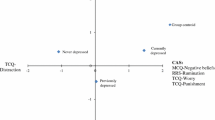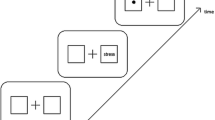Abstract
This study evaluates whether depressive symptomatology is related to the persistence, during recent symptomatic remission, of either dysfunctional attitudes, as hypothesized by Beck's cognitive theory of depression, or attributional biases, as predicted by Seligman's reformulated learned helplessness theory. Biased attributions did not relate either to the course of the depressive disorder or to symptom severity 6 months later. However, consistent with Beck's cognitive theory, dysfunctional attitudes after recent clinical remission correlated with subsequent symptom severity. Persistent dysfunctional attitudes during recent clinical remission may predict subsequent vulnerability to depressive symptoms, or these attitudes may be a more sensitive indicator of persistent depressive psychopathology than the classical signs and symptoms of a depressive episode.
Similar content being viewed by others
References
Abramson, L. Y., Seligman, M. E. P., & Teasdale, J. D. (1978). Learned helplessness in humans: Critique and reformulation.Journal of Abnormal Psychology, 87 40–74.
Beck, A. T. (1967).Depression: Clinical, experimental, and theoretical aspects. New York: Harper & Row.
Beck, A. T. (1976).Cognitive therapy and the emotional disorders. New York: International Universities Press.
Beck, A. T., & Beamesderfer, A. (1974). Assessment of depression: The depression inventory. P. Pinchot (Ed.),Modern problems in pharmacopsychiatry (Vol. 7). Basel, Switzerland: Hargen.
Beck, A. T., Ward, C. H., Mendelson, M., Mock, J., & Erbaugh, J. (1961). An inventory for measuring depression.Archives of General Psychiatry, 4 561–571.
Cutrona, C. (1983). Causal attributions and perinatal depression.Journal of Abnormal Psychology, 92 161–172.
Dobson, K. S., & Breiter, H. J. (1983). Cognitive assessment of depression: Reliability and validity of three measures.Journal of Abnormal Psychology, 92 107–109.
Eaves, G., & Rush, A. J. (1984). Cognitive patterns in symptomatic and remitted unipolar major depression.Journal of Abnormal Psychology, 93 31–40.
Golin, S., Sweeney, P. D., & Shaeffer, D. E. (1981). The causality of causal attributions in depression: A cross-lagged panel correlation analysis.Journal of Abnormal Psychology, 90 14–22.
Goodnight, J. H. (1979). Stepwise procedure. In J. T. Helwig & K. A. Council (Eds.),SAS Users Guide, 1979 Edition. Cary, North Carolina: SAS Institute.
Hamilton, M. (1960). A rating scale for depression.Journal of Neurology, Neurosurgery, and Psychiatry, 23 56–62.
Hammen, C. L., & Krantz, S. (1976). Effect of success and failure on depressive cognitions.Journal of Abnormal Psychology, 85 577–586.
Hollon, S. D., & Kendall, P. C. (1980). Cognitive self-statements in depression: Development of an automatic thoughts questionnaire.Cognitive Therapy and Research, 4 383–397.
Klein, D. C., Fencil-Morse, E., & Seligman, M. E. P. (1976). Learned helplessness, depression, and the attribution of failure.Journal of Personality and Social Psychology, 85 11–26.
Lewinsohn, P. M., Steinmetz, J. L., Larson, D. W., & Franklin, J. (1981). Depression-related cognitions: Antecedent or consequence?Journal of Abnormal Psychology, 90 213–219.
Manly, P. C., McMahon, R. J., Bradley, C. F., & Davidson, P. O. (1982). Depressive attributional style and depression following childbirth.Journal of Abnormal Psychology, 91 245–254.
Metalsky, G. I., Abramson, L. Y., Seligman, M. E. P., Semmel, A., & Peterson, C. (1982). Attributional styles and life events in the classroom: Vulnerability and invulnerability to depressive mood reactions.Journal of Abnormal Psychology, 43 612–617.
Miller, I. W., Klee, S. H., & Norman, W. H. (1982). Depressed and nondepressed inpatient's cognitions of hypothetical events, experimental tasks and stressful life events.Journal of Abnormal Psychology, 91 78–81.
Mukherji, B. R., Abramson, L. Y. & Martin, D. J. (1982). Induced depressive mood and attributional patterns.Cognitive Therapy and Research, 6 15–21.
O'Hara, M. W., Rehm, L. P., & Campbell, S. B. (1982). Predicting depressive symptomatology: Cognitive-behavioral models and postpartum depression.Journal of Abnormal Psychology, 91 457–461.
Peterson, C., Semmel, A., van Baeyer, C., Abramson, L. Y., Metalsky, G. I., & Seligman, M. E. P. (1982). The Attributional Style Questionnaire.Cognitive Therapy and Research, 6 287–300.
Raps, C. S., Peterson, C., Reinhard, K. E., Abramson, L. Y., & Seligman, M. E. P. (1982). Attributional style among depressed patients.Journal of Abnormal Psychology, 91 102–108.
Rizley, R. (1978). Depression and distortion in the attribution of causality.Journal of Abnormal Psychology, 87 32–48.
Seligman, M. E. P., Abramson, L. Y., Semmel, A., & von Baeyer, C. (1979). Depressive attributional style.Journal of Abnormal Psychology, 88 242–248.
Silverman, J. S., Silverman, J. A., & Eardley, D. A. (1984). Do maladaptive attitudes cause depression?Archives of General Psychiatry, 41 28–32.
Simons, A. D., Garfield, L. S., & Murphy, G. E. (1984). The process of change in cognitive therapy and pharmacotherapy for depression.Archives of General Psychiatry, 41 45–54.
Simons, A. D., Murphy, G. E., & Levine, J. C. (1984, June 19–23).Relapse after treatment with cognitive therapy and/or pharmacotherapy: Results after one year. Paper presented at the 15th annual meeting of the Society for Psychotherapy Research, Lake Louise, Alberta, Canada.
Spitzer, R., Endicott, J., & Robins, E. (1978). Research diagnostic criteria: Rationale and reliability.Archives of General Psychiatry, 35 73–782.
Weissman, A. N. (1979). The dysfunctional attitude scale: A validation study (Doctoral dissertation, University of Pennsylvania, 1979).Dissertation Abstracts International, 40 1389–1390B.
Author information
Authors and Affiliations
Additional information
This work was supported in part by a grant (MH-35370) from the National Institute of Mental Health to Dr. Rush. The authors wish to express their appreciation to Marie Marks, Judy Bement, and David Savage for their secretarial support; to Donna E. Giles, Ph.D., and Michael A. Schlesser, M. D., for their clinical support; and to Kenneth Z. Altshuler, M. D., for his administrative support.
Rights and permissions
About this article
Cite this article
Rush, A.J., Weissenburger, J. & Eaves, G. Do thinking patterns predict depressive symptoms?. Cogn Ther Res 10, 225–235 (1986). https://doi.org/10.1007/BF01173727
Issue Date:
DOI: https://doi.org/10.1007/BF01173727




